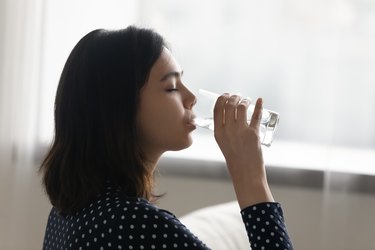
You know water is critical for overall health, but can it impact your cholesterol levels? Whether you have high cholesterol or want to keep your "bad" cholesterol levels in check, you may wonder if dehydration can affect your levels in any way. Here's the breakdown on water and cholesterol levels.
Video of the Day
Video of the Day
LDL and H2O: Why They Matter
According to the Mayo Clinic, high levels of the waxy substance known as cholesterol is bad news for your heart. When too much accumulates in your blood, it can clog your arteries, increasing your risk of blood clots that can lead to heart attack or stroke.
The Mayo Clinic notes that genetics play some role in predetermining your risk for developing high levels of the "bad" cholesterol (LDL). But your lifestyle choices — think diet, exercise and medication — can help lower your cholesterol. And thanks to healthy levels of the "good" cholesterol component (HDL), some of this LDL is swept away when HDL comes along and carries excess cholesterol back to the liver.
So you may be wondering how water factors in to those LDL or HDL levels, and whether dehydration can have deleterious effects on your cholesterol.
You know hydration is critical to your survival. As experts with the U.S. Geological Survey (USGS) point out, your body is composed of up to 60 percent water. Maintaining that level means that you ideally should take in 2.3 to 3.2 quarts of water a day (for adult women and men, respectively) through a combination of liquids and foods.
LDL, HDL and H2O Don’t Add Up
Can water intake be a factor in driving your cholesterol up or down? "Actually no," Dallas-based Lona Sandon, PhD, RDN, registered dietitian nutritionist and associate professor at the University of Texas Southwestern Medical Center, says. "Fluid intake does not affect cholesterol levels." On that note, it doesn't sound like water helps to reduce your LDL levels or increase your HDL levels.
Though, Sandon acknowledges, "that theory is out there" — adding that the notion is rooted in the idea that cholesterol acts "as a lubricant among cells." But there is nothing in the research that supports "that we should tell people to drink more water to lower their cholesterol," she says. "Nor is this in the Dietary Guidelines for Americans [published by the U.S. Department of Health and Human Services], for which experts have extensively reviewed the nutrition research to come up with recommendations for health promotion."
The bottom line: "No one has shown that drinking more water or fluid in general to improve day-to-day hydration status does anything to lower cholesterol levels and decrease your risk for cardiovascular disease," Sandon says.
Hydration Is Still Important
It may not be the the key to lowering your cholesterol, but it's important to note that hydration is still essential to your health because of the many important functions water does perform.
According to USGS, water nourishes cellular growth while regulating internal body temperature through sweating and breathing. And while coursing through your bloodstream, water essentially takes on the role of your body's head waiter, working 24/7 to distribute and deliver all the carbs, proteins and nutrients you eat to the doorstep of all your hungry organs and muscles.
Water also acts as a protective buffer for your brain and spinal cord, works to lubricate your joints and helps you get rid of all the unwanted waste.
So, it perhaps goes without saying that hydration is clearly ideal for your overall health. In fact, the Mayo Clinic warns that dehydration is potentially a very dangerous condition, particularly when children or seniors are involved. Thus, it's a good idea to stay on the lookout for any telltale signs of dehydration. Those signs, according to the Mayo Clinic, include extreme thirst, lightheadedness, exhaustion, diminished urination and/or dark-colored urine.
"Certainly staying adequately hydrated is good for you," Sandon says. "Water found in food and drinks is an essential nutrient. So follow your thirst as a guide to drink when you need to, and check your urine color."
- Lona Sandon, PhD, RDN, LD, registered dietitian nutritionist; associate professor, Department of Clinical Nutrition, School of Health Professions, University of Texas Southwestern Medical Center, Dallas
- Mayo Clinic: "High Cholesterol"
- U.S. Geological Survey: "The Water in You: Water and the Human Body"
- Mayo Clinic: "Dehydration"
Is this an emergency? If you are experiencing serious medical symptoms, please see the National Library of Medicine’s list of signs you need emergency medical attention or call 911.